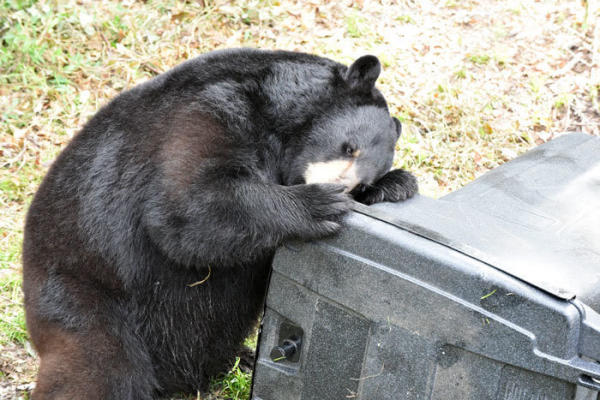
|
In fall, Florida black bear activity increases as bears begin a natural process of putting on fat for the winter. The Florida Fish and Wildlife Conservation Commission (FWC) reminds people to be BearWise to help prevent conflicts with Florida’s largest land mammal.
To be prepared for winter, bears require around 20,000 calories a day and will eat anything that’s convenient. Getting food from a garbage can often provide bears with more calories in a shorter amount of time than foraging in the woods. This easy source of calories draws more bears into areas where people live and work, which can be potentially dangerous for both people and bears.Keeping garbage secure not only helps keep people safe but also helps bears.
“We are assisting local governments with advice and funding to help them be more BearWise,” said Dave Telesco, head of the FWC’s Bear Management Program. “But everyone has a role. The best way people can help is by keeping trash secure from bears.”
Since 2007, a total of $2.1 million of BearWise funding has been provided to local governments. Over $1.4 million of this was provided with support from the Legislature and Gov. Scott, and $680,000 from the Fish & Wildlife Foundation of Florida using proceeds of the Conserve Wildlife license plate.
To keep bears wild and away from your home, follow these simple tips:
It is illegal in Florida to intentionally feed bears or leave out food or garbage that will attract bears and cause human-bear conflicts. If you see or suspect that someone is feeding or attracting bears, call the FWC’s Wildlife Alert Hotline at 1-888-404-FWCC (3922).
You can also help people and bears stay safe by remembering to watch for bears while driving. This time of year, bears are traveling across more roads in search of food, which results in more bear-vehicle collisions. Every year over 230 bears are killed on Florida roadways. The FWC advises drivers to be aware of their surroundings as they drive in bear country, especially around dusk and dawn, and when there is forest on both sides of the road. The FWC works with Florida Department of Transportation to post bear crossing signs in areas that receive particularly high levels of vehicle-bear collisions.
For more information on Florida black bears, including how to reduce conflicts with them, visit MyFWC.com/Bear and click on “Live BearWise.” There you can click on “brochures and other materials” to view “Vehicle Collisions with Bears” one in a series of FWC’s Living with Florida Black Bears videos.
Media contacts:
Statewide: Carli Segelson, 772-215-9459
Northwest: Bekah Nelson, 850-265-3676
North Central: Karen Parker, 386-872-0831
Northeast: Greg Workman, 352-239-2763
Southwest: Melody Kilborn, 863-227-3830
South: Carol Lyn Parrish, 850-556-2269